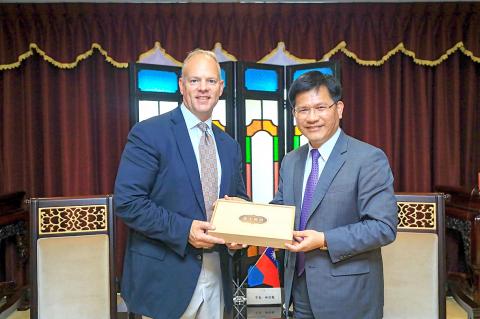A bill to encourage visits between the US and Taiwan at all levels was passed by the US House Committee on Foreign Affairs on Thursday.
The legislation now moves on to the floor of the House of Representatives.
The bill says that since the enactment of the Taiwan Relations Act in 1979, ties between the US and Taiwan have suffered from insufficient high-level communication due to the self-imposed restrictions that the US maintains on visits by high-ranking officials to Taiwan.

Photo: Huang Chung-shan, Taipei Times
“The United States government should encourage visits between the United States and Taiwan at all levels,” the bill says.
At present, senior US government officials rarely visit Taiwan because of Washington’s formal ties with China and a lack of official relations with Taipei.
When then-US Environmental Protection Agency administrator Gina McCarthy traveled to Taiwan in 2014, she was the first US Cabinet-level official to visit Taiwan in 14 years.
No other official of that level of seniority has visited since.
In a statement, committee chairman Ed Royce said the bill denounces the current practice of restricting official travel between the two sides and would serve to further strengthen the critical US-Taiwan partnership.
Before the Taiwan travel act can become law, it must be passed by both the House and the Senate, before being signed by US President Donald Trump.
In Taipei, Ministry of Foreign Affairs spokesman Andrew Lee (李憲章) yesterday said the ministry welcomed and thanked the Foreign Affairs Committee for passing the bill, which was proposed by US Representative Steve Chabot, one of the cochairs of the House Congressional Taiwan Caucus.
“The ministry believes the bill fully demonstrates [the US Congress’] support for mutual visits of senior officials from Taiwan and the US, and the advancement of US-Taiwan ties,” Lee said in a statement.
As a similar bill with the same title has been introduced in the US Senate by Republican Senator Marco Rubio, the ministry said it would be watching developments closely.
Additional reporting by Stacy Hsu

People can preregister to receive their NT$10,000 (US$325) cash distributed from the central government on Nov. 5 after President William Lai (賴清德) yesterday signed the Special Budget for Strengthening Economic, Social and National Security Resilience, the Executive Yuan told a news conference last night. The special budget, passed by the Legislative Yuan on Friday last week with a cash handout budget of NT$236 billion, was officially submitted to the Executive Yuan and the Presidential Office yesterday afternoon. People can register through the official Web site at https://10000.gov.tw to have the funds deposited into their bank accounts, withdraw the funds at automated teller

PEACE AND STABILITY: Maintaining the cross-strait ‘status quo’ has long been the government’s position, the Ministry of Foreign Affairs said Taiwan is committed to maintaining the cross-strait “status quo” and seeks no escalation of tensions, the Ministry of Foreign Affairs (MOFA) said yesterday, rebutting a Time magazine opinion piece that described President William Lai (賴清德) as a “reckless leader.” The article, titled “The US Must Beware of Taiwan’s Reckless Leader,” was written by Lyle Goldstein, director of the Asia Program at the Washington-based Defense Priorities think tank. Goldstein wrote that Taiwan is “the world’s most dangerous flashpoint” amid ongoing conflicts in the Middle East and Russia’s invasion of Ukraine. He said that the situation in the Taiwan Strait has become less stable

CONCESSION: A Shin Kong official said that the firm was ‘willing to contribute’ to the nation, as the move would enable Nvidia Crop to build its headquarters in Taiwan Shin Kong Life Insurance Co (新光人壽) yesterday said it would relinquish land-use rights, or known as surface rights, for two plots in Taipei’s Beitou District (北投), paving the way for Nvidia Corp to expand its office footprint in Taiwan. The insurer said it made the decision “in the interest of the nation’s greater good” and would not seek compensation from taxpayers for potential future losses, calling the move a gesture to resolve a months-long impasse among the insurer, the Taipei City Government and the US chip giant. “The decision was made on the condition that the Taipei City Government reimburses the related

FRESH LOOK: A committee would gather expert and public input on the themes and visual motifs that would appear on the notes, the central bank governor said The central bank has launched a comprehensive redesign of New Taiwan dollar banknotes to enhance anti-counterfeiting measures, improve accessibility and align the bills with global sustainability standards, Governor Yang Chin-long (楊金龍) told a meeting of the legislature’s Finance Committee yesterday. The overhaul would affect all five denominations — NT$100, NT$200, NT$500, NT$1,000 and NT$2,000 notes — but not coins, Yang said. It would be the first major update to the banknotes in 24 years, as the current series, introduced in 2001, has remained in circulation amid rapid advances in printing technology and security standards. “Updating the notes is essential to safeguard the integrity